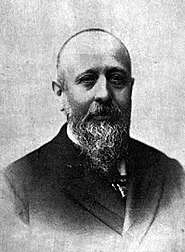Fernando Arbós y Tremanti
Fernando Arbós y Tremanti (22 October 1844, Rome - 18 December 1916, Madrid) was a Spanish architect; best known for the Iglesia de San Manuel y San Benito.

(date unknown)
Life and work
He was born in Rome to the painter, Manuel Arbós, and his wife Gertrudis.[1] From 1862 to 1865, he studied the fine arts in Paris. In 1869, he began to study architecture in Madrid. The following year, together with José María Aguilar y Vela, he won a competition for a public project, sponsored by the "Monte de Piedad y Caja de Ahorros de Madrid" (now known simply as the Caja Madrid).[2]
After completing that project, he continued to work for them; designing their headquarters, in the Plaza de Celenque (now demolished), and their Casa de las Alhajas (House of Jewelry), in the nearby Plaza de San Martín, which is still in use as an exhibition hall. He also designed La Casa Encendida, another bank building which is now a cultural center, and structures for the "Necrópolis del Este", now known as the Cementerio de la Almudena (1877).
When the original Basilica of Nuestra Señora de Atocha was demolished in 1890 and the streets were realigned, the Board of Trustees held a competition for a new temple. Arbós was awarded first prize and oversight of the project, but it was never fully realized. Only the cloister and the bell tower were completed. The cloister is now part of the Pantheon of Illustrious Men. The unfinished temple was severely damaged during the Spanish Civil War. It was eventually demolished and rebuilt.
Selected projects
_04.jpg) Casa de las Alhajas
Casa de las Alhajas_13.jpg) Iglesia de San Manuel y San Benito
Iglesia de San Manuel y San Benito- Cementerio de la Almudena (entrance)
_01.jpg) Casa Encendida
Casa Encendida
References
- Lámperez y Romea 1917, p. 83.
- Fernando Arbós y Tremanti, Santi Cortés, (1889), El arquitecto Fernando Arbós y Tremanti: (Roma, 1844. Madrid, 1916), Caja de Ahorros y Monte de Piedad de Madrid
Further reading
- Vicente Lampérez y Romea; Las ciudades españolas y su arquitectura municipal, Real Academia de Bellas Artes de San Fernando, 1917 Online
External links
![]()